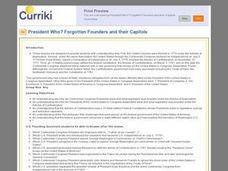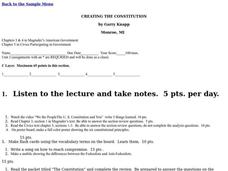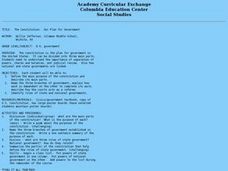PBS
Lessons in Leadership, Roosevelt Style
It's easy to criticize those in power until you're sitting at their desk, faced with the same decisions. A history lesson prompts secondary learners to research the Roosevelt presidencies through the lens of leadership and...
K12 Reader
Branches of Government
Set down the basics of the three branches of government with the reading passage included here. After reading, class members answer five questions related to the passage.
West Virginia Department of Education
A State of Convenience: The Creation of West Virginia
Ever wondered why there is a West Virginia but not an East Virginia? The resource answers questions like this one and more as it takes an in-depth and detailed look at the history of West Virginia and how it became a state. Several...
Curated OER
Comprehension Skills: Evaluate Using Fiction Stories and Aesop's Fables
Primary readers investigate several comprehension skills in the ten lessons of this unit. Forming opinions about stories, comparing stories to each other, using Venn Diagrams, and applying the ideas from a story to real life situations...
Center for History and New Media
The Impact of the Jim Crow Era on Education, 1877–1930s
Even though American slaves were officially emancipated in 1865, the effects of slavery perpetuated throughout the 19th and 20th centuries. Middle and high schoolers learn about the ways that discrimination and the Jim Crow laws...
PBS
The Roosevelts: An Intimate History—Snapshot Lessons
The Roosevelt family was one of the most influential and prominent political forces in the 20th century, leaving behind a wide-ranging legacy of conservation, progressivism, and economic growth. Learn more about President Theodore...
Curated OER
Birth of a Nation
Fifth graders portray one of the actual framers of the Constitution. They summarize each class period with a journal entry and culminate the experience with the actual framing and signing (or not signing) of the Constitution.
Curated OER
Abolish the Office of Governor
Students explore the history of the Pennsylvania Constitution of 1776. In this historical analysis lesson, students analyze the constitution of the state and determine how citizens benefited (or didn't benefit) from the document....
Curated OER
President Who? Forgotten Founders and Their Capitols
Students explore the beginning of the United Colonies that were formed in 1774. In this history lesson, students discuss the Articles of Confederation and then answer questions about the events surrounding the development of the...
Curated OER
Citizenship Worksheet 5 - Local and State Government
The Tenth Amendment of the United States Constitution delegates rights that have not been defined by the federal government to the states. But what are the responsibilities of state governments? What about county and city governments?...
Curated OER
Expansion and Reform: Applying the Declaration of Independence
Students conduct inquiries and research-acquiring, organizing, analyzing, interpreting, evaluating, and communicating facts, themes, and general principles operating in American history. They use the Declaration of Independence to...
Curated OER
Create Your Own Constitution
Eighth graders explore the processes, purpose and components of a good and just constitution. They focus on the Constitution of the United States of America. Students discuss the purpose of a constitution and reasons why the Constitution...
Curated OER
CREATING THE CONSTITUTION
Learners engage in a variety of activities aimed at strengthening comprehension of the Constitution. The activities are part of a layered curriculum and students create a portfolio for assessment.
National First Ladies' Library
Presidential Illness: Constitutional Crisis?
Pupils use the internet and other sources to explore incidents where the President of the United States has become incapacitated. They research the reasons for the 25th Amendment, and solutions set in place to solve the problem of...
Curated OER
American Revolution and Constitution Take-Home Assessment
In this early American history activity, learners draw diagrams of that feature the responsibilities of each of the 3 branches of the federal government and then create their own original visuals that highlight the formation of American...
Curated OER
Bill of Rights
Students are introduced to the Bill of Rights. After their introduction, they interview adults about the rights and create a list of them in their own words. They graph the results and analyze them and share their conclusions in a...
Curated OER
Political Differences 2
A single slide provides students with a graphic organizer to fill out about political differences. Categories include state representation, The House, Missouri, and California. Tip: Save this PowerPoint to use as a template for more...
Curated OER
After: A Study of Individual Rights
Use the dystopian novel After by Francine Prose to spark discussion about individual and student rights. Learners read the novel, evaluating how far a school can go to control its attendees. As they read, scholars...
Curated OER
ONE VOTE
In order to understand the political process and the importance of voting, pupils will construct a class time line. They will group up and research a specific era, creating a time line of political events where one vote made a...
Curated OER
Rights and Responsibilities, Is It Breaking the Law?
Students investigate the life and trial of Rev. John Mahan who was involved with the illegal Underground Railroad. The issue of breaking the law to help slaves escape is examined in this lesson.
Curated OER
What is Due Process Anyway?
Students examine the term due process and its historical origins. They compare and constrast the requirements of due process in the United States Constitution and the Indiana Constitution. They also discuss the difference between...
Curated OER
The Changing Meaning of "Due Process"
Students examine the United States Constitution and how the application for due process differs in two amendments. They research the changing definition of the term since the Civil War. They use the internet to research press coverage of...
Curated OER
The Constitution: Our Plan for Government
Students investigate the importance of separation of powers, checks, balances, and judicial review. They also investigate how national and state governments are linked.
Curated OER
Constitution Word Search Puzzle
In this social studies worksheet, students find the words that are related to the concept that is the theme of the word search puzzle.

























